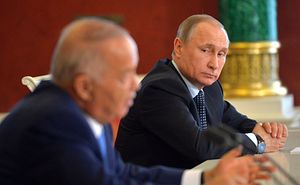At one point during his lengthy statement to the press following meetings with Russian President Vladimir Putin, Uzbekistan’s President Islam Karimov said, “Frankly speaking, I talked more, and Mr. President [Putin], he must have drawn his own conclusions.”
Karimov seldom leaves Uzbekistan and at 78-years-old is the region’s oldest leader.
His two-day visit to Moscow resulted in the usual raft of documents–for example, agreements on the export of military products, on cooperation between sports ministries, and on cooperation between Bauman Moscow State Technical University and the Tashkent Institute of Railway Engineering–but the interesting bits are in the press statements made on Tuesday, in which Karimov out-talked Putin (2,611 words to 833, based on the Kremlin’s English-language transcript).
The Uzbek leader waxed esoteric at times about the “rare meeting when we openly talked about problems that concern both Russia and Uzbekistan.”
Karimov praised Putin for his “personal attention” to the Uzbekistan-Russia relationship but also highlighted his own “personal privilege” in being able to speak “very bluntly” with the Russian leader. “It is a privilege that I use sparingly, of course. But nevertheless I am very pleased with his trust. Trust is not something that you give to just anyone, they say.”
He rambled on:
Yet, this is both good and bad, a plus and a minus. A minus because not everyone likes it, but a plus because I feel so relieved that I said it. I said something I had spent long evenings and nights pondering, and troubling over sometimes: why have I not done this, why have I chosen a different option, why did the course of events go here and not there, and could I have influenced it all, and so on. So yesterday’s conversation was frank, very frank.
What’s kept Karimov up at night? Security in Afghanistan, obviously.
Uzbekistan, which currently holds the Shanghai Cooperation Organization presidency, is set to host the SCO summit in June. But as Joshua Kucera points out on Eurasianet, while Karimov and Putin might have both ranked security and cooperating to deal with Afghanistan as top-line issues, they “publicly disagreed on how to do it.” Notably, in their side-by-side remarks Putin mentioned Afghanistan only once, saying “ We are convinced of the need to form a broad anti-terrorist coalition, acting on the basis of international law and under the auspices of the UN, especially with regard to Afghanistan.” In the past, as Kucera comments, Putin has supported the increased involvement of the SCO in Afghanistan.
Karimov is far from convinced, despite an earlier statement in which he said, “I would even describe [Afghanistan] as a smouldering war with no end in sight.” Karimov pushed for Russian involvement in negotiations in Afghanistan, but said in his statement for the press, “it is essential to prevent the SCO from getting involved in the military and political developments in that country.” In Karimov’s mind, getting involved means that the SCO will be regarded by “Kabul, all of Afghanistan and far beyond it – practically by the entire world” as therefore prepared to “assume full responsibility for the settlement of the Afghan crisis.”
The Uzbek president then commented that the SCO needs to focus on its long-term interests, following that statement with a pointed reference to economic issues–increasing bilateral trade and investment–which he views as the appropriate core concern for the SCO. He then dove into a lengthy aside about fruit and vegetables in an attempt to support the notion that despite the collapsed ruble–which has dragged down the value of trade with Russia–the volume of trade has kept pace:
All calculations are made in dollars or in some other units, as it has now become trendy. However, the best possible option, as we became accustomed in our younger days, is to calculate everything in physical volumes, so that we can tell if we are moving forwards or backwards.
Karimov was touched that Putin made direct reference to fruit and vegetable trade statistics in an earlier statement at the start of their talks. Putin noted that the “import of grapes went up 20-fold and of citrus fruit — 54 times. This is a substantial increase for the Russian market.”
Despite such astounding increases in volume, the value of trade between Russia and Uzbekistan has nonetheless fallen. As Eurasianet reported earlier this week in a detailed review of Uzbek-Russian relations, the “Russian ambassador to Uzbekistan, Vladimir Tyurdenev, told reporters in Tashkent in December that trade between the two countries in the first three quarters of 2015 had fallen by 29.2 percent year-on-year, to $2.14 billion, because of the depreciation in the value of the ruble.”
The massive increase in Russian purchases of Uzbek fruits and vegetables is likely directly tied to Moscow’s retaliatory sanctions on Europe banning the import of food from the West. Karimov seemed to be aware of this–even if it went unsaid–and sought to lock in Uzbekistan’s new-found market share, pressing for “a business entity, an agency” to assess the needs of various Russian regions for Uzbek fruit and vegetables “at least five years in advance.”
“You know what vegetables are,” he said. “They are not cotton. Vegetables and fruit are sown today and crops are harvested in November or October. Therefore, we should know several years in advance what the needs are…”
The message is clear: what you sow today will be reaped sometime later.

































